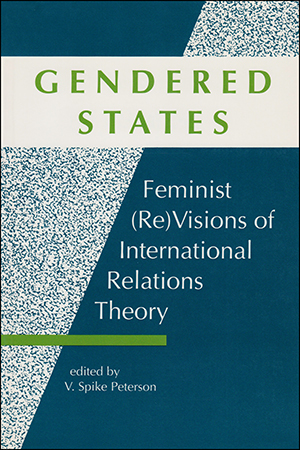V. Spike Peterson, editor
While IR theorists are increasingly critical of neorealist assumptions about the state and the international system, few have explored the gendered construction of the state and its implications for IR. Recognizing this, the authors of this innovative collection explore how core concepts of political and IR theory—the state, sovereignty, power—are reframed through feminist lenses.
Taking seriously the question "What difference does gender make?," the authors illuminate new directions in IR by highlighting the role of gender in constructing and maintaining the sovereign state system and its related notions of security, autonomy, and identity.
V. Spike Peterson is associate professor of political science at the University of Arizona. She is coauthor (with Anne S. Runyan) of Global Gender Issues.
"A cutting-edge theoretical work."—Emily Stoper
"A convincing feminist assault on the traditional state-centered conception of international relations."—Diplomatic History
"A rich and valuable collection of articles written from a variety of critical feminist perspectives."—Resources for Feminist Research
"Any serious scholar of international relations theory and every instructor of world politics ought to read this book."—Science & Society
"Provides sophisticated and interesting analysis of fascinating and important issues."—Women's Philosophy Review
"Gendered States provides an important critique of international relations theory by problematizing one of the theory's most central and privileged concepts, the state. . . . a sneak preview of what the underlying basis of a revised theory of international relations should include."—American Political Science Review
"A welcome addition to international relations theory literature. . . . Provides a way to understand feminism's unique contributions to international relations and to academic thinking more generally. Throughout the text the authors have deconstructed the gender-biased empirical knowledge and theoretical perspectives and then reconstructed our knowledge and theories from the perspectives gained."—International Journal
"A welcome introduction to a new and growing field in international relations scholarship."—Harvard International Review






